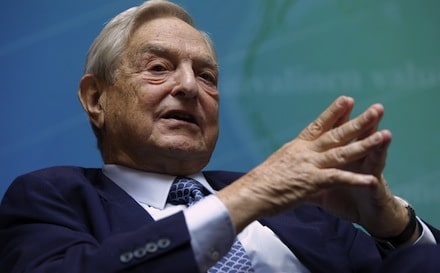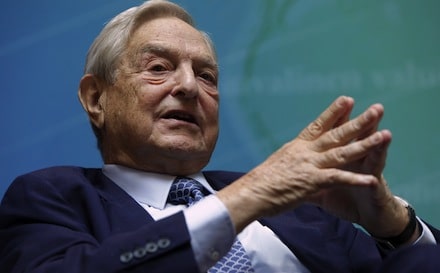
Last week we reported on the DC Leaks hack of what was over 2,500 documents detailing how George Soros and his NGOs influence world leaders, drive foreign policy, and help to create unrest in sovereign nations, that many times leads to chaos and civil war.
One country of particular focus for George Soros and his NGOs is Ukraine.
It is now accepted fact that Soros was deeply involved in the Maiden protests in 2014 and the violent coup, that saw a democratically elected government overthrown in the name of “EU values”.
What is even more troubling, as revealed by the DC Leaks hack, is how Soros and his network of “non-profit organisations” worked to lobby EU member states into not only buying his Ukraine “Maidan” narrative, but to also disavow any ties and support for Russia.
Leaked documents show that George Soros was active in mapping out the Greek media landscape with generous grants, so as to further his Ukraine project, while also using his deep pockets to get Greek media to turn against the Russian Federation…in what can only be described as a well-funded and orchestrated smear campaign.
In one document entitled: “Open Society Initiative For Europe (OSIFE). Mapping the Ukrainian debate in Greece”(Ukraine and Europe-greece-tor ukraine debate mapping greece.docx), Soros offers a consultant a remuneration of $6,500 (gross) for “at least 15 full working days in carrying out this task” plus all expenses paid.
The aim of this task:
The consultant is expected to chart the main players in the Greek debate on Ukraine, outline the key arguments and their evolution in the past 18 months. Specifically, the report will
take stock of any existing polling evidence
provide a ‘who is who?’ with information about at least
– 6 newspapers,
– 10 audiovisual outlets (TV and radio),
– 6 internet sites,
– About 50 opinion leaders and trends in social networks[1].Categorize the main strains of discussion and eventually identify different sides / camps of the discussion.
Provide a brief account of how Russia has tried to influence the Greek debate on Ukraine through domestic actors and outlets
Include a section with recommendations on
– What are the spaces OSF should engage and would most likely to have impact?
– What are the voices (of reason or doubt) that should be amplified?
Open Society Initiative For Europe (OSIFE) selected Iannis Carras for the Greek media mapping grant. The justification why he was chosen…
All contracts were for the same amount. We needed to find highly specialized researchers to map the debate on Ukraine in Europe, therefore we identified a shortlist of candidates in consultation with colleagues in the Think Tank Fund, OSEPI and in consultation with members of the OSIFE board and chose the most qualified who could produce the report in the time allowed. In the case of Greece we agreed that Iannis Carras, an economic and social historian of Balkan and Russian relations with expert knowledge of Greece’s NGOs and social movements, was the best suited to the task.
What is even more interesting is not the grant from OSIFE, but a letter from grant winner Carras to a person named Mathew (another Greek speaker???), outlining his plan in detail for pushing Soros’ Ukraine agenda in Greece.
Of significance is how Carras tells Mathew about Greek society’s overall suspicion of The Open Society after the roll in played in seeding unrest in Yugoslavia. Carras even tells Mathew to not mention The Open Society in Greece.
“Do you want your name to appear alongside mine on the paper? Do make comments on all of the below.
In general, and at your discretion, do not say you are doing this for Open Society because it is likely to close down doors. There’s a lot of suspicion about Open Society in Greece, mainly because of its positions vis-à-vis the former Yugoslavia. As I am simultaneously writing an article for Aspen Review Eastern Europe that can be used as the organisation for which research like this is taking place.”
Carras then goes on to outline his approach in manipulating Greek society, covering topics such as:
1. Media.
2. Political parties and think tanks
3. Opinion polls.
4. Business relations.
5. Religious and cultural ties.
6. Migration and diaspora.
7. Greece and Ukraine in the context of Greece’s economic crisis.
8. Greece, Ukraine and the Cyprus issue.
9. Names and brief description of significant actors: a ‘who is who?’ with information on at least 50 opinion leaders
Carras notes how Russia has much goodwill in Greece, exercising “signifiant soft power”. Carras notes that Greece is, at this moment, a weak player in the Ukraine debate and the Greek Foreign Minister Kotzias realises this.
Summary: I am working on the hypotheses largely born out by the interviews carried out so far thatRussia has significant soft power in Greece though this does not easily convert into hard power (e.g. vetoing EU sanctions).Greeks are basically not very interested in Ukraine and the crisis there. They reflect and understand that conflict through their own economic crisis and their relations with Europe (nowadays primarily Europe and not US). To the extent that relations with Europe remain the focus and do not go off the rails, Greece will bark but will not bite. If they improve, Greece might not even bark (as can be seen with Greece’s policy on Israel, Kotzias can be very much a realist).
Carras does warn that should Greece’s economic situation deteriorate further, than Greece may very well look to Russia for support, and this has implications on the Ukraine plan.
If they deteriorate however, Greece will be looking to Russia for increased support and will alter its Ukraine policies accordingly. Do you agree with these hypotheses? Can you find confirmation for or against them in the media outlets examined?
Carras places extra emphasis on influencing the media in Greece, citing various large news outlets that the Soros NGO can target, including approaching left wing and right wing blogs.
This is the bulk of the work (we have to think about how to divide the work up). We have to provide a ‘who is who?’ with information about at least 6 newspapers, 10 audio-visual outlets (TV and radio) and 6 internet sites. Some of these will be obvious, but, even in these cases, change over time (at least eighteen months) is an important consideration. Here are some suggestions for newspapers:Kathimerini, Avgi, Ta Nea, Vima, Efymerida Syntakton, Eleutherotypia, Proto Thema, Rizospastis? etc. What else? Protagon? Athens Review of Books? (info on Kotzias). As for TV, we’ll just do the main ones. What about left wing blogs? What about commercial radio stations? I think we should cover Aristera sta FM. Sky. What else? Anything from the nationalist and far right? My choice would be Ardin (already looking at this) which at least tries to be serious. Patria is even more unsavoury. I’ll deal with the religious web sites in the culture and religion appendix. I think we should interview Kostas Nisenko (http://www.kathimerini.gr/757296/article/epikairothta/kosmos/viaih-epi8esh-kata-toy-antapokrith-ths-ka8hmerinhs-sthn-krimaia) and Kostas Geropoulos of New Europe to get into the issues involved… not at all sure though that it’s advisable to talk to the Russia correspondents Thanasis Avgerinos, Dimitris Liatsos, Achileas Patsoukas etc. (I know all of them). Also if we come across articles with interesting information on any one of the topics, we should mail them to one another.
Attention is placed on influencing political parties. Carras sees this as a more difficult task, as parties in Greece would not be warm towards turning their back on Russia.
Who if anyone deals with Russia / Ukraine within each of the political parties? How important are political parties in formulating policies? (my hunch is totally unimportant). I must admit I have little idea of how to proceed with this one, but I have written to the academic Vassilis Petsinis and I hope I’ll get to skype with him soon. Think-tanks are easier, and, I think, more important. I have already interviewed Thanos Dokos (director Greek foreign policy institute, ELIAMEP) in person.
Carras notes how he has approached various religious leaders, academics and actors, to gauge a sense of how deep Russia’s influence and “soft power” runs in Greek society and culture.
So far I have interviewed by telephone Metropolitan John of Pergamum (one of the top figures in the inner circle of the Istanbul based Ecumenical Patriarchate). I have read Metropolitan Nektarios of the Argolid’s recent book (2014), “Two bullets for Donetsk”. I have tried but so far not succeeded in contacting Metropolitan Nektarios himself, and have started work on two of the main religious news websites romfea.gr and amen.gr .
With respect to culture I intend to contact Georgos Livathinos, leading director of Russian and other plays and Lydia Koniordou, actress. Also the management of the Onassis Centre, particularly Afroditi Panagiotakou, the executive vice-director who is quite knowledgeable in this field having travelled to both Ukraine and Russia.
In 2016 Greece and Russia will be hosting each other as the focus of cultural events in the two respective countries. I will be looking to understand the extent to which Russia’s unparalleled cultural soft-power might translate into Greek policy making.
Greek military is the final point of influence, with Carras interviewing Ambassadors and policy decision makers.
Foreign policy and the Greek military. So far I have interviewed in person Ambassador Elias Klis (formerly ambassador of Greece to Moscow, advisor to the current Foreign Minister, advisor to the Greek Union of Industrialists. He is perhaps the single most important person for understanding Greek-Russian diplomatic relations at present). Ambassador Alexandros Philon (formerly ambassador of Greece to Washington, to whom I am related). Captain Panos Stamou (submarines, extensive contacts in Crimea, also secretary and leading light of the Greek-Russian historical association) who emphasised the non-political tradition of the Greek armed forces. Tempted to talk to Themos Stoforopoulos for a nationalist left wing view. I have also read foreign minister Kotzias’ latest book. All of this has provided me with useful insights for appendices 7 and 8, and particularly for the connection to the Cyprus issue (which at the moment Greece is very keen to downplay).
Carras places an emphasis on Cyprus, perhaps recognising the islands affinity to support Russia and its large Russian diaspora community.
The recommendations will be for the medium and the short term, cited here based on interviews carried out so far. Medium term recommendations will include a cultural event (to be specified later) and a one-day conference on Ukraine and international law, citing precedents for dealing with the situation in Ukraine (particularly Cyprus). Recommendations may include capacity building for local Ukrainian migrant spokesperson(s). Short term recommendations will include an action pack on what Greece has at stake in Ukraine, and ways to narrate parallels in interactions between nation and empire vis-à-vis Greece / Ukraine. Think about whether these work / what else we might recommend?
Reprinted with permission from The Duran, where original documents can be read.

